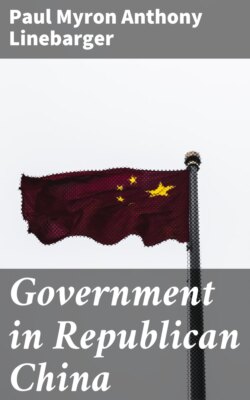Government in Republican China

Реклама. ООО «ЛитРес», ИНН: 7719571260.
Оглавление
Paul Myron Anthony Linebarger. Government in Republican China
Government in Republican China
Table of Contents
INTRODUCTION
Notes
FIRST PART. MOVEMENTS
Chapter I
CONFUCIANISM
Notes
Chapter II
THE RISE OF NATIONALISM
Notes
Chapter III
BATTLING CREEDS
Notes
SECOND PART. ARMIES
Chapter IV
WARRIORS
Notes
Chapter V
CAUSES
Notes
THIRD PART. GOVERNMENTS
Chapter VI
THE EMPIRE
Notes
Chapter VII
THE REVOLUTION
Notes
Chapter VIII
RECONSTRUCTION
PARTY MEMBERSHIP
Party Congress
Notes
CONCLUSION
Notes
CHRONOLOGY OF DYNASTIES
INDEX
Отрывок из книги
Paul Myron Anthony Linebarger
Published by Good Press, 2019
.....
Confucianism supposes that the truth and the socially desirable are identical; that both are identical with the Confucian tradition; and that an elite of scholars is required to propagate truth, clothing it with the language of tradition and morality. Confucianism is hostile to the very notion of sovereignty, leaves no room for a system of permanently separate nations, and is unable to accommodate the Western idea of an accidental growth in knowledge, dependent upon sporadic individual initiative. Confucianism is strong in so far as it promotes a society based upon knowledge, in which individuals can ascend or descend according to their personal virtue and competence. Such an ideal has a definite end in the physical universe by working toward a human immortality of the flesh and the spirit—flesh through the perpetuation of the family name in the male line, spirit through the transmission of records and knowledge. Its present-day defects are obvious. The world of fact in the Confucian ideology does not correspond with the beliefs accepted as fact by the dominant West. The intellectual insulation against the outside necessary to ideological control could not be achieved by any single modern nation without the use of tyranny. Moreover, Confucian ethics and politics, more than twenty-four centuries old, can scarcely be expected to conform to the changed minutiae of human life, dominated by technology. Nevertheless, while the Chinese may not turn again to the classics for guidance in concrete situations, or consult ancient authorities for solutions to simple practical problems, the moral and social doctrines of Confucianism, redefined or modified, could well play a definite role in the modern world. In China the chief rivals to Confucianism will be the new heterodox schools of reinterpreted Confucianism—such as the versions posed by Sun Yat-sen and Chiang K'ai-shek, or the watery Confucianism of Manchoukuo.
The nonformal unorganized power of Confucianism weighs more heavily. If Confucianism were to be considered alone on the strength of the movements featuring the password "Back to Confucius!" it would be so negligible as to merit no attention. Not the strength of its partisans but the concessions of its opponents and rivals make Confucianism important. Confucius can no more be eradicated from modern China than Plato, Aristotle, and Christ from the background of Western society. Every Chinese movement, starting with Confucianism as the status quo, will have to incorporate a large part of the traditional doctrines. It may well be that in the new breeds of thought the Confucian strain will prove dominant and most lasting.
.....